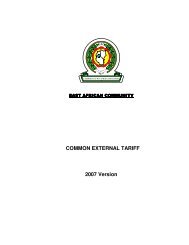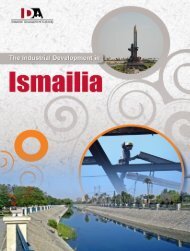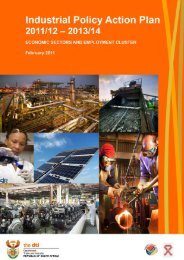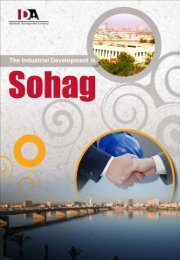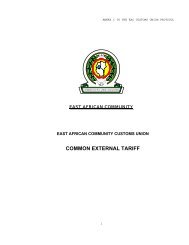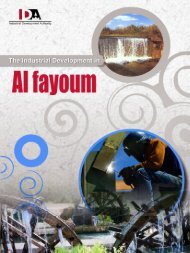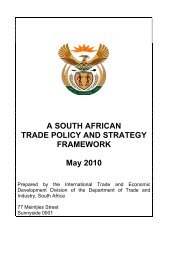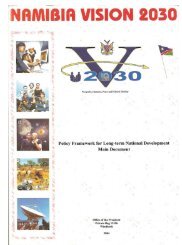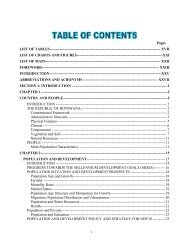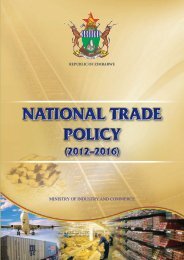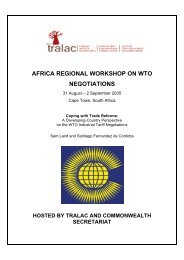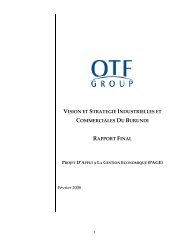rwanda national export strategy - minicom
rwanda national export strategy - minicom
rwanda national export strategy - minicom
You also want an ePaper? Increase the reach of your titles
YUMPU automatically turns print PDFs into web optimized ePapers that Google loves.
RWANDA NATIONAL EXPORT STRATEGY<br />
will develop a <strong>strategy</strong> for identifying the different channels through which these impressions are formed<br />
as well as a <strong>strategy</strong> for aggressively managing its brand position in these channels.<br />
4.2.7 LEVERAGING TECHNOLOGY<br />
Almost 85% of Rwandan product <strong>export</strong>s are concentrated in Rwanda‘s commodity <strong>export</strong> sectors of tea,<br />
coffee and minerals. Tourism, which comprised 44% of all <strong>export</strong>s in 2010, has been growing at a fast<br />
rate, but industry players do not leverage ICTs. In order to achieve Vision 2020 goals of becoming a<br />
knowledge-based economy, high- tech capacity must be developed to generate foreign currency, and to<br />
infuse higher productivity into established sectors. This should include creating linkages between high<br />
technology firms and Rwanda‘s developed industries. Rwanda has laid a firm foundation for ICT<br />
development and some of the key ICT infrastructure deployed include: the <strong>national</strong> fiber optic backbone;<br />
wireless broadband network (WIBRO); and Internet data centre. As of 2010, the ICT subscriber base had<br />
increased as follows: Fixed line (21,687 in 2005 to 32,000 in 2010); Mobile (304,000 in 2005 to<br />
3,600,000 in 2010); Internet (6,814 in 2005 to 450,000 in 2010).<br />
Priority Issues and Challenges<br />
Issue #1 Increase the skill base for innovation and high productivity. A strong skill base is<br />
essential for the technological advancement that will help to improve the productivity in <strong>export</strong> sectors.<br />
Programs include incentivizing the private sector, expanding internship programs, and leveraging FDI<br />
that has access to the latest technology and training. Skills can be further developed as local firms gain<br />
access to major government IT projects, including the African Payment Gateway in partnership with the<br />
Commonwealth Business Council (CBC), and an e-platform to showcase Rwandan firms.<br />
Issue #2 Improve access to networks of productivity. First, telecommunications must conform to<br />
regional and inter<strong>national</strong> standards. Half of the businesses surveyed in the BICS cite access and cost for<br />
telecommunication as a constraint. Fewer than 2% of the businesses surveyed can access the internet,<br />
while only 5% have mobile phone access. 38 Second, firms need better linkages with supply chains,<br />
experts and local and regional networks outside their industry for new innovations. This will include<br />
accelerating the infusion of ICTs into current and nascent industries and involves identifying and<br />
attracting anchor tenants, and marketing Rwandan firms for regional projects.<br />
4.2.9 HUMAN CAPITAL DEVELOPMENT<br />
Rwanda has made significant investments in developing its human capital and will continuously develop<br />
relevant market skills in order to successfully implement its <strong>national</strong> and sector <strong>export</strong> strategies.<br />
Education, knowledge and investments in R&D will allow Rwanda to develop knowledge -intensive<br />
production and <strong>export</strong> competencies to compete in inter<strong>national</strong> markets.<br />
Priority Issues and Challenges<br />
Issue #1 Improve Government Agencies‟ capacity to facilitate private sector <strong>export</strong>. Training of<br />
Government officials on <strong>export</strong>-related issues can help support <strong>export</strong>s. Currently, stakeholders complain<br />
of a lack of knowledge among government support institutions. In order to rectify this situation, each<br />
institution could encourage the development of experts on <strong>export</strong>-related issues. For example, RRA could<br />
have a specific person assigned to <strong>export</strong> taxation issues in each of <strong>export</strong> sector and MAGERWA could<br />
better classify <strong>export</strong>s to inter<strong>national</strong> markets to meet the requirements of buyers.<br />
Issue #2 The skills gap within the <strong>export</strong> labour market must be addressed. There is a need to<br />
improve skills at an accelerated rate throughout the economy. Recruiting and training staff is seen by<br />
Rwandan businesses as a major human resource problem, with nearly 40% of those surveyed in the<br />
Business Investment Climate Survey reporting difficulties recruiting and training competent staff. An<br />
informal World Bank study states that 41% of businesses cannot perform basic accounting, and although<br />
training programs are beginning to address this, much more is needed. High staff turnover and a lack of<br />
38 Source is the 2008 PSF Business Investment Climate Survey<br />
Page 26



